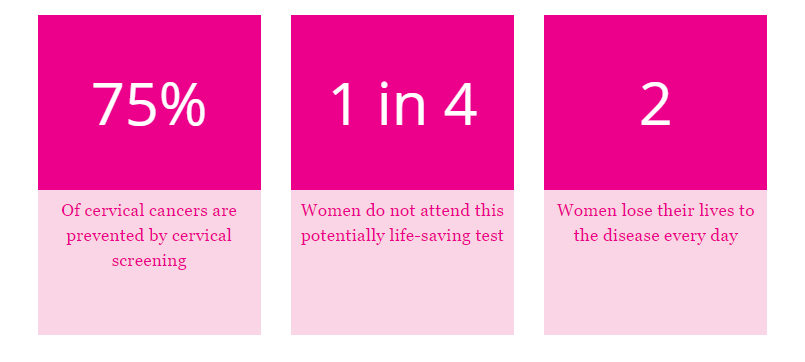The dreaded words… “Put your legs in the stirrups please.” No one particularly likes to go to the gynecologist. Okay maybe some of you do but for most of us, it’s not on our top ten list of fun things to do for the afternoon. However, it is SO necessary. Cervical screening (smear tests) prevent up to 75% of cervical cancers from developing, yet one in four women do not attend when invited.
Amongst females in the UK, cervical cancer is the 13th most common cancer, with around 3,200 cases diagnosed in 2014. More than half (52%) of cervical cancer cases in the UK each year are diagnosed in females aged under 45.

Cervical cancer is highly preventable with regular screening tests and appropriate follow-up care. It also can be cured when found early and treated. A pap smear takes only a few minutes, but can save the lives of women by detecting cervical cancer early and therefore giving a woman the opportunity to prevent or treat any abnormalities before they become life-threatening.
Cervical cancer is almost always caused by the human papillomavirus (HPV). Vaccines are available to protect against the types of HPV that most often cause cervical cancer.
HPV is very common and is passed from one person to another during sex. It is so common that nearly all sexually active men and women get it at some point in their lives, but few women will get cervical cancer. Talk to your health care provider about whether the HPV test is right for you.
Screening Tests
Two tests can help prevent cervical cancer or find it early—
- The Pap test (or Pap smear) looks for precancers, which are cell changes on the cervix that might become cervical cancer if they are not treated appropriately.
- The HPV test looks for the virus that can cause these cell changes.
The Pap test is recommended for women between ages 21 and 65, and can be done in a doctor’s office or clinic. Women should start getting Pap tests regularly at age 21. If your Pap test results are normal, your doctor may say you can wait three years until your next Pap test. If you are 30 years old or older, you may choose to have an HPV test along with the Pap test. Both tests can be performed by your doctor at the same time. If your test results are normal, your chance of getting cervical cancer in the next few years is very low. Your doctor may then say you can wait as long as five years for your next screening.
The HPV vaccine is now being administered in UK schools to young girls in year 8. It is important to ensure that parents as well as daughters are made fully aware that this vaccine does NOT prevent cervical cancer – not at all – the vaccine prevents (or reduces the growth of) the virus found in abnormal cells in the early stages of cervical cancer. Think very seriously before you allow your young daughter to receive this vaccine.
Cervical Screening Awareness Week

Jo’s Cervical Cancer Trust wants you to #BeCervixSavvy
How you can make a difference
- Order free information materials to raise awareness about screening in your workplace, school, GP surgery or community centre
- Share our messages on social media, using the text: ‘Attending your cervical screening (smear test) can reduce your risk of cervical cancer. Find out how at www.jostrust.org.uk #CSAW’
- Download and share our CSAW graphic
- Ask your employer to sign up to Time to Test, our latest campaign to encourage employers to allow women the time to attend if they cannot get an appointment out of working hours
- Host an event to raise money to help us to continue our work
- Take part in our annual Steps for Jo’s event taking place during the week of CSAW
- Raise awareness in your GP surgery or practice, you can find some inspiration in our latest Cervical Screening Award winners






